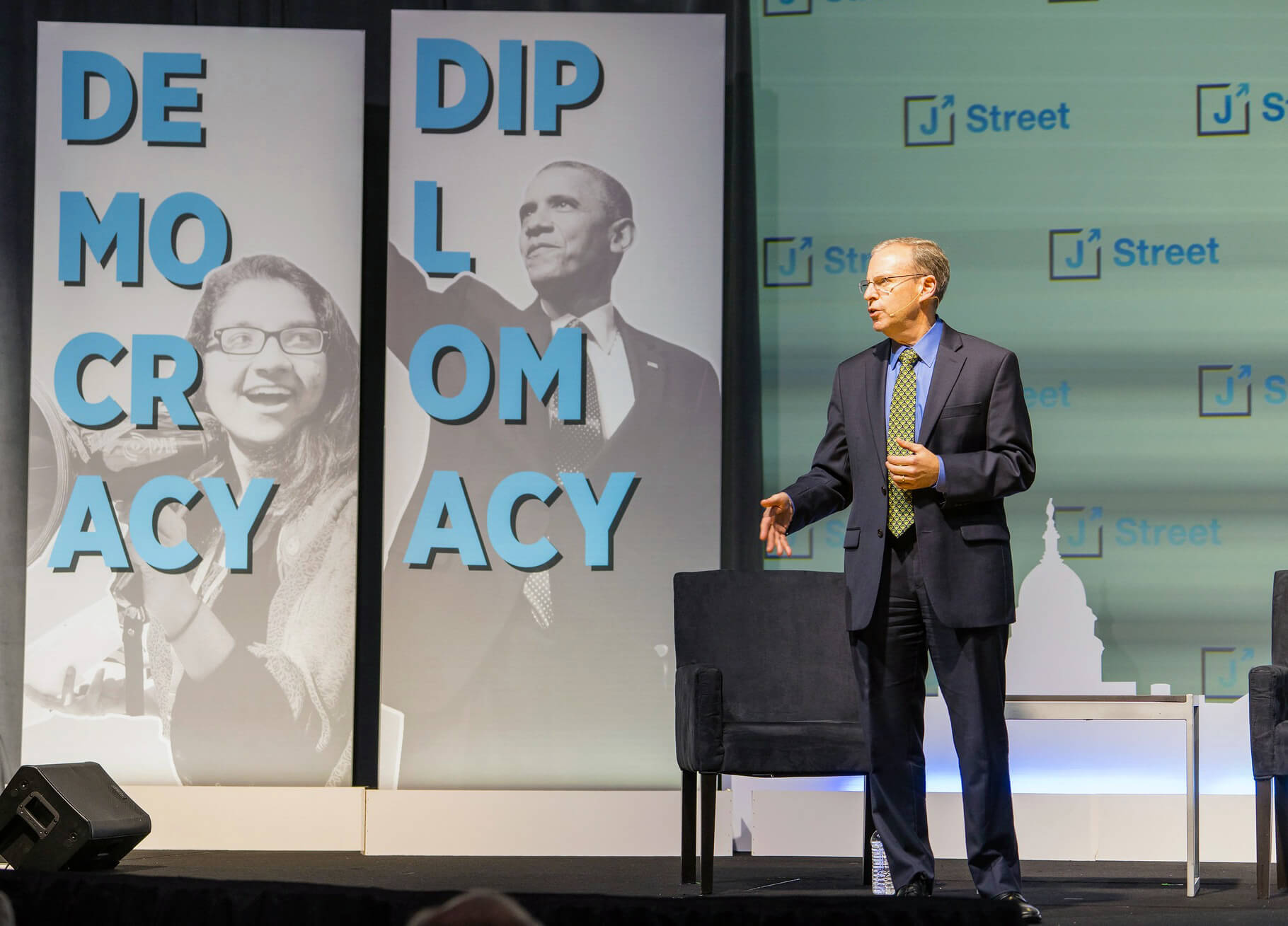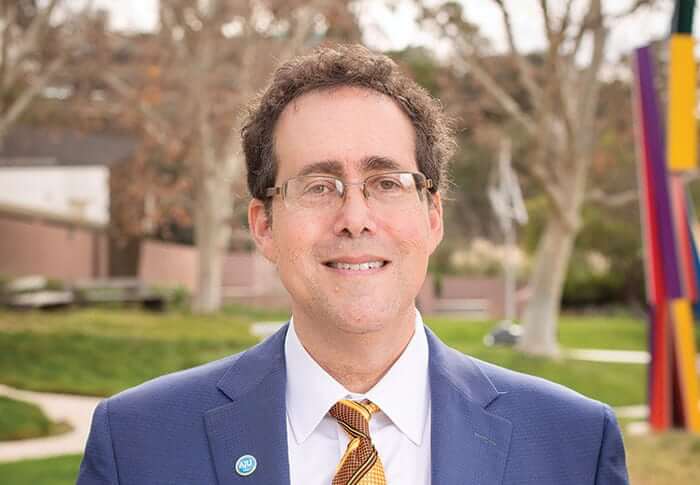Here’s why J Street isn’t focusing on Israel ahead of midterm elections
“J Street is not a two-state solution organization, that’s a mistaken premise,” Jeremy Ben-Ami, J Street’s founding director, said in an interview

Graphic by Angelie Zaslavsky
When J Street, the liberal Israel advocacy organization, released an online advertisement two weeks before the midterm elections, it featured the kind of message progressive Jews have become accustomed to hearing in recent years.
“As Jewish Americans, we know all too well that democracy can be a fragile thing,” the narrator intones over images of refugees from Nazi Germany. “When MAGA Republicans come for our democratic freedoms, they better believe we’re ready for the fight.”
The J Street video, which was promoted on social media as the “pro-Israel, pro-peace” organization’s closing message to Jewish voters as they head to the polls, ticked through liberal policy priorities like immigrant rights, abortion and holding those who attacked the Capitol on January 6 accountable, before concluding with a blunt instruction: “Vote for democracy.”
It was perhaps most notable for what it did not include: any reference to Israel or the Middle East.
The omission was striking for an organization that was founded 15 years ago to be President Barack Obama’s “blocking back” in Congress on pushing for a two-state solution to the Israeli-Palestinian conflict.
“There’s no question that J Street has moved more into the domestic policy space,” said Halie Soifer, chief of the Jewish Democratic Council of America. Soifer’s group released its own advertisement on the same day as J Street with a nearly identical message.
J Street has thrown its weight behind a package of Congressional legislation to expand voting rights and grant statehood to Washington, D.C., and has railed against state laws that the organization believes would limit access to the ballot box. Its December conference is themed around “defending democracy,” with a keynote address by Rep. Jamie Raskin, who led one of the impeachment trials against former President Donald Trump, and sessions on fighting antisemitism, and refugee policy in the United States.
The shift in J Street’s work comes both as the prospects of a two-state solution appear moribund and a plurality of Jewish voters list “the future of democracy” as one of their top concerns in the upcoming election.
Jeremy Ben-Ami, the organization’s director and founder, acknowledged an expansion of J Street’s work that started during the Trump administration and gained momentum in recent years. But he said that the focus on voting rights and democracy was consistent with its founding mission.
“J Street is not a two-state solution organization, that’s a mistaken premise,” Ben-Ami said in an interview.
He said that J Street’s goal was to show elected officials that American Jews both hold a relatively liberal outlook toward Israel — strong support for a Palestinian state and a dim view toward settlement construction — and that they prioritize other issues above Israel.
J Street v. AIPAC
That message is meant partly to rebuke the more conservative AIPAC, which has used its new political action committee to pursue a scorched earth strategy against progressive Democrats who question unconditional American support for Israel, even as those politicians support other policies favored by most Jewish voters.
The image of American Jews projected by AIPAC “is that we’re an Israel-right-or-wrong constituency and if Israel veers off to the right, American Jews are just fine with that,” he said.
Ben-Ami cited comments by Howard Kohr, AIPAC’s chief executive, to the Washington Post over the summer that he couldn’t name anything that would stop AIPAC from endorsing a political candidate that supported Israel.
“He said, ‘I can’t think of anything,’ right? ‘Nothing else matters,” Ben-Ami said. “Our mission is to explain that, to American Jews, everything else matters.”
Despite endorsing at least 48 of the same Congressional candidates this cycle, J Street and AIPAC have been involved in an increasingly acrimonious war of words unrelated to Israel. AIPAC has come under fire for funneling conservative dollars into Democratic primary contests and running advertisements that avoid mention of the Jewish state, focusing instead on issues like crime.
J Street has sent email blasts decrying “AIPAC’s New Low,” “AIPAC’s smears” and “AIPAC’s Right-Wing Billionaires.” For its part, AIPAC claims that J Street’s support for progressives shows that it does not back Israel.
“J Street is many things, but it’s not pro-Israel,” AIPAC has taken to saying on Twitter,
The two organizations have faced off in races where Israel isn’t a top issue for the candidates, like the contest for a Pittsburgh Congressional seat where Summer Lee, a state senator endorsed by J Street, has come under attack from AIPAC. Lee has no voting record on Israel and during the primary emphasized that she “absolutely” supports Israel’s right to remain a Jewish state. But critics viewed her past criticism of Israeli violence against Palestinians as one-sided and damning.

IfNotNow, an organization founded in 2014 to oppose American Jewish support of the Israeli occupation, has also found itself drawn to more domestic policy issues during the current election cycle.
Eva Borgwardt, the group’s political director, said this was in direct response to AIPAC’s actions.
“Those candidates that AIPAC is backing also oppose many of the other issues that our members deeply care about: climate change, LGBT rights, systemic racism in the U.S., immigration rights,” said Borgwardt, whose organization sits to the left of J Street. “So it sort of by necessity means we’re also working on domestic issues.”
(Marshall Wittman, an AIPAC spokesman, defended the organization’s endorsements and noted that the organization had endorsed nearly half of the Progressive Caucus members. “Being pro-Israel is completely consistent with progressive values,” he said in an email.)
‘Nothing for them to do here’
But there’s another stark reality about the Israeli-Palestinian conflict that has turned J Street more toward domestic concerns: “There is nothing for them to do here,” said Jonathan Rynhold, a political scientist at Bar-Ilan University in Israel.
J Street was founded to promote a diplomatic solution to the conflict, but that appears further away than ever with the Israeli election Tuesday sweeping in what is likely to be the country’s most right-wing government in history, and the Biden administration showing no interest in pursuing a peace agreement.
“It would be an illusion to tell people somehow there’s going to be a brand new diplomatic resolution to resolve the conflict,” Ben-Ami acknowledged.

Some liberal Jewish groups, like IfNotNow, have confronted the stalemate by moving further left. IfNotNow, for example, has begun using the term “apartheid” to describe conditions in Israel, the West Bank and Gaza. But J Street disagrees with that language, has declined to support conditioning American aid to Israel and Ben-Ami periodically finds himself scolding members of the organization’s college chapters for straying too far from J Street’s liberal Zionist ideology.
“There’s not going to be a vote in Congress to actually condition or restrict aid for decades to come,” Ben-Ami said. “We’re looking for effective things that can actually happen.”
Those things include lobbying Congress to apply pressure on Israel to stop new settlement construction or evictions in east Jerusalem – strategies J Street’s membership no doubt support, but which may not sound particularly inspiring.
“It’s not very exciting to say, ‘We have to keep open the option of a two-state solution,’” said Rynhold, author of “The Arab-Israeli Conflict in American Political Culture.” “It is increasingly important – at least I think it is – but it’s not exactly something that gets your membership fired up.”
















